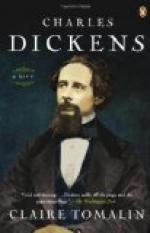That Dickens felt an honourable pride in the general affection he inspired, can readily be understood. He also felt, even more honourably, its great responsibility. He knew that his books and he himself were a power for good, and he foresaw how greatly his influence would suffer if a suspicion of hypocrisy—the vice at which he had always girded—were to taint his reputation. Here, for instance, in “Little Dorrit,” the work written in the thick of his home troubles, he had written of Clennam as “a man who had, deep-rooted in his nature, a belief in all the gentle and good things his life had been without,” and had shown how this belief had “saved Clennam still from the whimpering weakness and cruel selfishness of holding that because such a happiness or such a virtue had not come into his little path, or worked well for him, therefore it was not in the great scheme, but was reducible, when found in appearance, to the basest elements.” A touching utterance if it expressed the real feeling of a writer sorely disappointed and in great trouble; but an utterance moving rather to contempt if it came from a writer who had transferred his affections from his wife to some other woman. I do not wonder, therefore, that Dickens, excited and exasperated, spoke out, though I think it would have been better if he had kept silence.
But he did other things that were not justifiable. He quarrelled with Messrs. Bradbury and Evans, his publishers, because they did not use their influence to get Punch, a periodical in which Dickens had no interest, to publish the personal statement that had appeared in Household Words; and worse, much worse, he wrote a letter, which ought never to have been written, detailing the grounds on which he and his wife had separated. This letter, dated the 28th of May, 1858, was addressed to his secretary, Arthur Smith, and was to be shown to any one interested. Arthur Smith showed it to the London correspondent of The New York Tribune, who naturally caused it to be published in that paper. Then Dickens was horrified. He was a man of far too high and chivalrous feeling not to know that the letter contained statements with regard to his wife’s failings which ought never to have been made public. He knew as well as any one, that a literary man ought not to take the world into his confidence on such a subject. Ever afterwards he referred to the letter as his “violated letter.” But, in truth, the wrong went deeper than the publication. The letter should never have been written, certainly never sent to Arthur Smith for general perusal. Dickens’ only excuse is the fact that he was clearly not himself at the time, and that he never fell into a like error again. It is, however, sad to notice how entirely his wife seems to have passed out of his affection. The reference to her in his will is almost unkind; and when death was on him she seems not to have been summoned to his bedside.




